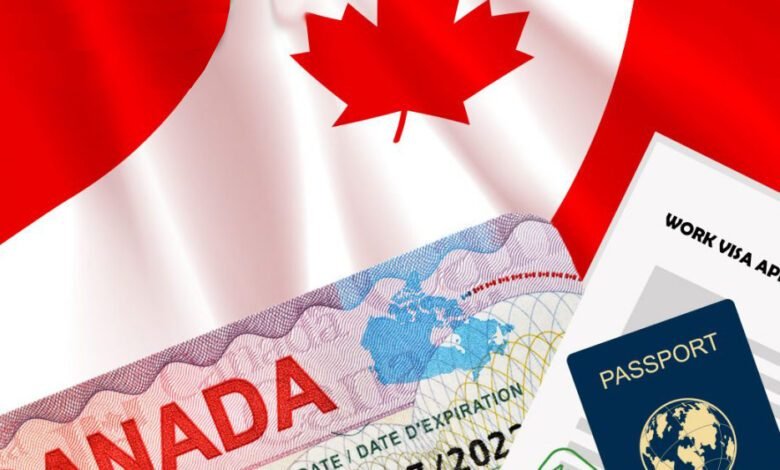REQUIREMENTS AND TYPES OF CANADA VISA

To meet Canada visa requirements, prepare necessary documents like passport, application form, proof of funds, travel itinerary, and photos. For a student visa, guarantee acceptance letter, clean record, and funds proof for study permit. Work permit eligibility relies on program completion. Business visa criteria include showing genuine interest, investment capability, and sector experience. Permanent residency offers various pathways based on qualifications. Super Visa needs relationship proof, medical insurance, and financial stability. Extend visas with eligibility check and documentation submission. Understanding these types and requirements opens doors to legal entry and stay in Canada.
Key Takeaways
- Various visa types: Tourist, Student, Work, Business, Permanent Residency.
- Specific requirements: Valid passport, completed application form, proof of funds, travel itinerary.
- Duration varies: Study permit based on study period, work permit based on completion of program.
- Different pathways: Express Entry, PNP, Family Sponsorship, CEC for Permanent Residency.
- Essential documentation: Invitation letter, medical insurance, financial stability proof for visa applications.
Tourist Visa Requirements
To secure a tourist visa for Canada, you must fulfill specific requirements set by the Canadian government. The visa application process involves submitting the necessary documentation to support your visit. You’ll need a valid passport, a completed visa application form, proof of sufficient funds to cover your stay, a travel itinerary, and a letter of invitation if applicable.
It’s crucial to verify that all documents are accurate and up to date to avoid any delays or issues with your application. Documentation for CANADA VISA REQUIREMENTS for a tourist visa also include a recent passport-sized photograph, a copy of your return ticket, and proof of accommodation arrangements for your stay in Canada. Additionally, you may be asked to provide a letter from your employer stating your job position and approved leave of absence, especially if you’re employed.
Student Visa Types
When applying for a student visa for Canada, you must bear in mind the different CANADA VISA TYPES available to choose the most suitable option for your academic pursuits.
Here are some key points to take into account regarding student visa types:
- Student Visa Duration:
The duration of your student visa will typically depend on the length of your academic program. Make sure you apply for a visa that covers your entire study period. - Study Permit Requirements:
To obtain a study permit, you’ll need an acceptance letter from a Designated Learning Institution (DLI), proof of funds to support yourself, a clean criminal record, and a medical exam in some cases. - Part-Time vs. Full-Time Study:
Different student visa types may have restrictions on whether you can work part-time during your studies. Be mindful of these limitations. - Post-Graduation Work Permit:
Some student visa types may allow you to apply for a post-graduation work permit upon completing your studies. This permit enables you to work in Canada temporarily after graduation.
Work Permit Eligibility
Consider whether your student visa type in Canada allows for eligibility to apply for a work permit upon completing your studies. Work permit eligibility is usually granted to students who’ve completed a program at a designated learning institution in Canada. However, there are certain work permit restrictions to keep in mind.
For instance, some student visa types may not automatically qualify for a post-graduation work permit. It’s important to check with Canadian immigration authorities to determine your specific eligibility for a work permit based on your student visa type.
On the other hand, there are work permit exemptions that may apply in certain situations. For example, spouses or common-law partners of full-time students may be eligible for an open work permit, allowing them to work while their partner studies in Canada.
Understanding the work permit restrictions and exemptions relevant to your visa type is essential for ensuring compliance with Canadian immigration regulations. Make sure to research and confirm your eligibility before applying for a work permit.
Business Visa Criteria
If you’re looking to apply for a Business Visa for Canada, you’ll need to meet specific eligibility requirements.
This includes details about the application process and necessary documentation.
Understanding these criteria is essential for a successful visa application.
Eligibility for Business Visa
To qualify for a business visa to Canada, you must meet specific eligibility criteria set by the immigration authorities. When considering applying for a business visa, make sure you meet the following requirements:
- Business Opportunities: You must demonstrate a genuine interest in exploring business opportunities in Canada. This could involve setting up a new business, investing in an existing one, or establishing business partnerships within the country.
- Investment Requirements: To be eligible for a business visa, you need to meet the investment requirements set by the Canadian government. This may include a minimum investment amount, a detailed business plan outlining your investment intentions, and proof of sufficient funds to support your business venture in Canada.
- Relevant Experience: Having relevant experience in the business sector you plan to operate in Canada can strengthen your application. Immigration authorities often look for applicants with a successful track record in their field.
- Legal Compliance: Make certain that your business activities align with Canadian laws and regulations. Adhering to legal requirements is vital for a successful business visa application.
Application Process Details
Understanding the business visa application process in Canada requires a thorough grasp of the specific criteria set by the immigration authorities. To successfully apply for a business visa, you need to follow a detailed process that includes submitting the necessary documents, completing the online application, and potentially participating in an interview process. Below is a table outlining key aspects of the application process:
| Application Process | Details |
|---|---|
| Document Checklist | Make sure you have all necessary documents such as proof of funds, business plan, and passport. |
| Processing Time | The processing time for a business visa application can vary but typically ranges from a few weeks to a few months. |
| Online Application | Complete the online application form accurately and provide all requested information. |
| Interview Process | Be prepared for a possible interview where you may be asked about your business intentions and background. |
Permanent Residency Pathways
Looking to make Canada your permanent home?
Learn about the different pathways available for obtaining Permanent Residency, the eligibility criteria you need to meet, and the application process you’ll have to go through.
Understanding these points will help you navigate the journey towards becoming a permanent resident of Canada.
Pathways for PR
You may qualify for permanent residency in Canada through various pathways based on your qualifications and circumstances. Here are some pathways you can consider:
- Express Entry: This system manages applications for permanent residence under three federal economic immigration programs.
- Provincial Nominee Program (PNP): Each province and territory in Canada has its own immigration programs that allow them to nominate individuals who wish to immigrate to Canada and are interested in settling in a particular province.
- Family Sponsorship: If you have a family member who’s a Canadian citizen or permanent resident, they may be able to sponsor your immigration to Canada.
- Canadian Experience Class (CEC): This program is for individuals who’ve worked in Canada and gained skilled work experience that contributes to their professional growth.
Understanding these immigration options and residency requirements can help you navigate the process of obtaining permanent residency in Canada more effectively.
Eligibility Criteria
To qualify for permanent residency in Canada through various pathways, you must meet specific eligibility criteria tailored to your qualifications and circumstances. The eligibility criteria encompass factors such as educational background, work experience, age, and adaptability. Each pathway may have unique requirements; as a result, it’s important to thoroughly review the eligibility criteria before applying.
One essential aspect of the eligibility criteria is meeting the financial requirements. This involves demonstrating that you have enough funds to support yourself and your family members in Canada. Additionally, language proficiency is a key factor in determining eligibility for permanent residency. Depending on the pathway you choose, you may need to take a language test to prove your proficiency in English or French.
As part of the eligibility criteria, you’ll also need to provide a document checklist that includes various forms, identification documents, educational certificates, work references, and other supporting materials. Ensuring that you meet all the eligibility criteria and submit the required documents accurately is vital for a successful permanent residency application.
Application Process
Prior to commencing the application process for permanent residency in Canada, make sure you have carefully reviewed and met all the eligibility criteria specific to your chosen pathway. Once you have confirmed your eligibility, you can proceed with the application process.
Here are some key steps to guide you through the process:
- Gather Documentation: Collect all the necessary documents required for your permanent residency application, such as identification papers, proof of funds, and any other specific documents based on your chosen pathway.
- Complete Application Forms: Fill out the application forms accurately and ensure all information provided is correct and up to date to avoid delays in processing.
- Prepare for Visa Interview: Be ready for a visa interview if required as part of your application process. Familiarize yourself with common questions and make sure you present yourself professionally.
- Understand Processing Times: Familiarize yourself with the visa processing and approval timeline to manage your expectations and plan your next steps accordingly. Stay informed about any updates or requests from the immigration authorities to facilitate a smooth application process.
Super Visa Essentials
Understanding the essential requirements for a Super Visa application is important for prospective visitors to Canada.
When applying for a Super Visa, you must provide documentation proving your relationship to a Canadian citizen or permanent resident, along with a letter of invitation from them.
Additionally, you need to showcase that you have purchased private medical insurance with coverage for at least one year, have sufficient funds to support yourself during your stay, and pass a medical examination.
The Super Visa allows for an extended visit to Canada, typically up to two years per visit, providing an excellent opportunity to spend quality time with family.
To guarantee a smooth application process, it’s essential to demonstrate financial stability and the ability to abide by the visa duration regulations.
Visa Extension Process
Exploring how to extend your visa in Canada can provide valuable insights into prolonging your stay in the country legally. When considering the visa extension process, it’s important to familiarize yourself with the documentation requirements to guarantee a smooth and successful application.
Here are four essential steps to guide you through the visa extension process:
- Check Eligibility: Verify if you’re eligible for a visa extension in Canada based on your current visa type and circumstances.
- Prepare Required Documents: Gather all necessary documentation, such as a valid passport, proof of financial support, and a letter explaining the reason for your extension.
- Submit Application: Complete the visa extension application accurately and submit it along with the required documents to the appropriate immigration office.
- Attend Biometrics Appointment: If needed, schedule and attend a biometrics appointment to provide your fingerprints and a photo for identity verification.
Frequently Asked Questions
Can I Work Part-Time on a Student Visa in Canada?
Yes, you can work part-time on a student visa in Canada. There are work restrictions, but you’ll have employment opportunities to gain experience and support yourself while studying. Make sure to adhere to the visa guidelines.
Is There a Limit to How Many Times I Can Extend My Visa?
You can extend your visa multiple times, but there are limits. Make sure to check the specific guidelines for your visa type to understand how many extensions are allowed before reaching the limit.
Are There Specific Industries That Qualify for a Work Permit?
In Canada, work opportunities exist in specific industries. Eligibility for a work permit hinges on meeting criteria set by regulations. However, work permit restrictions may apply depending on the field you wish to work in.
Can I Apply for Permanent Residency While on a Tourist Visa?
While on a tourist visa, you cannot apply for permanent residency in Canada. Permanent residency restrictions apply to tourist visa holders. Changing from a tourist visa to permanent residency requires following the proper immigration procedures and requirements.
What Are the Financial Requirements for a Business Visa?
To apply for a business visa, you need to show income proof and provide bank statements. These documents demonstrate your financial stability and ability to support your business activities while in Canada.
Conclusion
Overall, securing a visa to Canada may seem intimidating, but with the right information and preparation, you can navigate the process successfully.
Whether you’re visiting as a tourist, studying, working, or establishing permanent residency, understanding the specific requirements and types of visas available is essential.
Remember to stay organized, gather all necessary documents, and seek assistance if needed.
With determination and patience, you can achieve your goal of traveling to or living in Canada.



